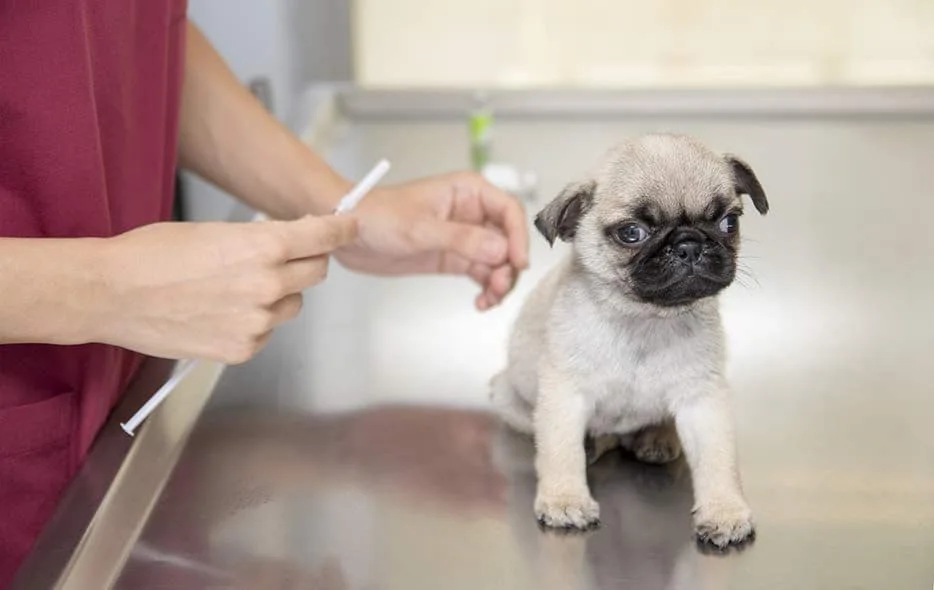Vaccinations are a necessary part of owning a pet, and the Laveen area is no exception. Without proper vaccinations in the first few weeks of life, puppies can be exposed to a range of illnesses, some of which can be fatal. Vaccinations are important for preventing infectious diseases, ensuring the longevity of our furry family friends, and promoting public health.
What Are Puppy Shots?
Puppy shots are a series of injections given to puppies in order to protect them from common illnesses. The core vaccinations typically include protection from canine parvovirus, distemper, and other illnesses. Additional vaccinations may be given depending on the age and health needs of the pup, as well as geographic location. By providing your puppy with these vaccinations in a timely manner, you can protect them from serious diseases and give them a healthier start.
Some of the vaccinations your puppy needs:
Canine Distemper - Canine distemper is a serious and potentially fatal disease that can affect puppies. It's caused by an airborne virus and can cause coughing, vomiting, and diarrhea. Puppies should receive their first dose of the distemper vaccine between six to eight weeks of age, with a booster given every one to two months until they are at least 15 weeks old.
Bordetella Bronchiseptica - This is a bacterium that can cause respiratory infections in dogs. Vaccinating your puppy against this bacterium is important for preventing the development of more serious illnesses. The vaccination can be given as early as three weeks old and should be repeated every three to four weeks until the puppy has had all of its vaccinations, at which point it should receive a booster once a year.
Canine Parainfluenza - Canine parainfluenza is a contagious respiratory disease that affects puppies and adult dogs. Vaccination against this virus is essential for protecting your pet from a potentially serious illness. Puppies should be vaccinated for parainfluenza at least twice, beginning at 6-8 weeks of age. Vaccinations should be repeated every 3-4 weeks.
Rabies Vaccination - Rabies is a highly contagious and potentially fatal virus, so it is essential to ensure that your puppy receives the rabies vaccination. It's recommended to vaccinate puppies between week 12 and 16, and a booster should be administered every 1-3 years. It's important to note that rabies is required by law in most states, including Arizona.
Parvovirus - Parvovirus is a virus that is particularly dangerous for puppies, as it can cause severe illness and even death in unvaccinated dogs. It's important for Laveen pet owners to ensure that their puppies are vaccinated against this virus.
Infectious Canine Hepatitis - This is an infectious viral disease that is spread through contact with body fluids or contaminated surfaces and can cause serious illness or even death if left untreated. Vaccination is the best protection against the disease.
Benefits Of Shots For Your Puppy
Vaccinating your puppy is one of the most important things you can do to keep them healthy. Vaccinations also help reduce the risk of contracting serious illnesses and even some forms of cancer. There are many places that require proof of vaccinations in order for puppies to participate in activities, such as dog parks or doggie daycare.
Risks From Not Vaccinating Your Puppy
Not vaccinating your dog can put them at risk of contracting serious and even life-threatening conditions. Unvaccinated puppies can also be more prone to developing chronic illnesses or even cancer later in life. It's essential to ensure that your puppy is kept up to date with all of their necessary vaccinations. Not doing so can put their health and well-being at risk.
Vaccines Available for Your Pup
Core Vaccines - These are vaccinations that are recommended for all dogs, such as rabies, distemper, parvovirus, etc. These vaccinations should ideally begin when the pup is at week 8 of life, with a booster at 12 weeks. After that, puppies should get boosters every 1 to 3 years, depending on the type of vaccine. It is also important to discuss any additional (non-core) vaccinations that may be needed based on the puppy’s individual lifestyle and risk factors with a veterinarian.
Non-Core Vaccines - These are not required for puppies but may be recommended depending on the individual dog’s lifestyle. They protect against illnesses such as Bordetella, Leptospirosis, and Rattlesnake venom. While these may not be necessary for all puppies, they can protect against serious and potentially deadly illnesses that your pet may come into contact with. Talk to a veterinarian about which non-core vaccines are right for your puppy and their lifestyle.
Frequently Asked Questions
Phoenix Veterinary Center receives questions daily about puppy shots. Here are a few of the most common:
Are vaccinations safe?
Vaccinations are a safe and effective way of protecting your puppy from contagious diseases. At Laveen Veterinary Center, puppies receive vaccinations that help protect them against common illnesses such as parvovirus, distemper, and rabies. Vaccinations are given in a series of shots over a period of time, and the puppy must be healthy for each injection. While minor side effects like soreness or swelling may occur after the vaccinations are administered, these typically resolve quickly. Rest assured that vaccinations can help keep your puppy happy and healthy for years to come.
How dangerous is Lyme disease?
Lyme disease is caused by the bacterium Borrelia burgdorferi and is transmitted through the bite of an infected tick. Symptoms of Lyme disease include fever, fatigue, joint pain, and rash. If left untreated, it can cause serious damage to the heart, joints, and nervous system. To help protect your pet against this dangerous illness, it is important to make sure that they are up to date on all of their vaccinations.
Are there any alternative vaccination schedules available for puppies?
Yes, there are alternative vaccination schedules available for puppies. Laveen Veterinary Center can help you develop an appropriate schedule based on your puppy's age, lifestyle, and breed. Depending on the lifestyle of your pet, some vaccines may be split up into multiple doses to provide the best protection while minimizing any potential side effects. Additionally, some vets may suggest a titer test to assess your puppy’s vaccine status rather than administer all of the core vaccinations at once. Talk to your vet about the best option for your pup so that you can keep them safe and healthy.
Are there any adverse reactions to vaccinations that I should be aware of?
Vaccinations are generally considered safe and effective, but it's possible to experience some adverse reactions. Generally, these reactions are mild and short-lived and include things like soreness or redness at the injection site, fever, lethargy, and loss of appetite. If your puppy experiences any of these symptoms after a vaccination, contact us immediately for advice on how to best manage them. It's important to monitor your puppy for any signs of a reaction following vaccination.
Are there any natural alternatives to traditional vaccinations?
While traditional vaccinations are an important part of keeping your puppy healthy and protected from disease, some pet owners may be interested in exploring natural alternatives. Herbal remedies, homeopathic treatments, and essential oils are just a few of the options available for those who wish to pursue a more natural approach to protecting their puppies from illness. However, it is important to note that these treatments have not been evaluated or approved by the FDA and should always be used under the guidance of a vet. It’s important to remember that these alternatives are not a substitute for regular vaccinations, which remain the most effective way to protect your pup from disease.
What diseases do vaccinations protect against?
Vaccinations are important for protecting your pet from a variety of illnesses. Vaccines are available to guard against illnesses such as distemper, rabies, parvovirus, hepatitis, and leptospirosis. Depending on your pet's risk factors and age, your vet may also recommend additional vaccinations to keep your pet fully protected. It is important to discuss which ones are right for your puppy with your vet to ensure that they receive the best possible protection.
What age should puppies start receiving vaccinations?
Puppies should begin receiving vaccinations at around 8 to 10 weeks of age. This should continue until they reach 16 weeks of age. It is important to consult your veterinarian for an exact puppy vaccination schedule for your puppy, as different vaccines may be recommended based on the puppy's breed, lifestyle, and any pre-existing health conditions. In some cases, boosters may need to be given every few years throughout a puppy's life in order to keep them fully protected against certain illnesses.
Can a dog survive rabies?
Rabies is a potentially fatal illness that must be taken seriously. Rabies vaccines are the only sure way to protect your puppy from this deadly virus. Without a proper rabies vaccine, your pup may not survive an encounter with a rabid animal. Even with vaccination, however, it’s important to monitor your pup for any signs of rabies infection and contact your vet immediately if any symptoms are present. Your vet can provide more information on the prevention and treatment of rabies as well as other preventive measures you can take to keep your pup safe.
Is it safe to vaccinate a pregnant puppy?
Vaccinating a pregnant puppy is generally safe, but it should be done with caution. It is important to use vaccines that are specifically labeled for use in pregnant pets. The vaccination should be given no earlier than two weeks before the expected due date. While there is a possibility that the mother may pass some of the vaccine’s protection to her puppies through her milk, it is not a guarantee. Therefore, vaccinating the puppies after they are born is still recommended.
Are there any age restrictions on when puppies can get vaccinated?
It's important to follow the puppy vaccination schedule set by vets. It's important to note that puppies younger than week 8 may be more vulnerable to some illnesses and should not receive any vaccinations until they are old enough. Some vaccinations are only available after a certain age and may require special approval from a vet.
Schedule Your Puppy’s Shots Today
All puppies need their vaccinations to ensure they remain as healthy and happy as possible. At the Phoenix Veterinary Center, we offer comprehensive vaccination care in Phoenix, AZ, and the surrounding cities.
To schedule your puppy's shots with our senior pet care team, contact us today at (602) 559-5500 or send us a message online. A member of our team will answer your initial questions and help you book an appointment with one of our experienced and professional Phoenix veterinarians. If you are happy with the veterinary services we provide, then please do not hesitate to leave us a review or refer us to your friends. Call today!



